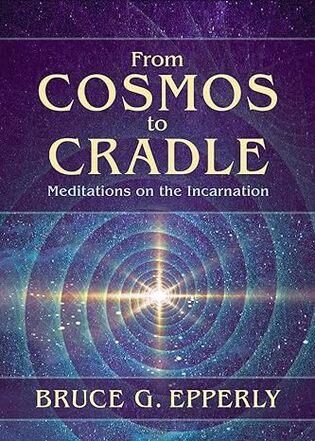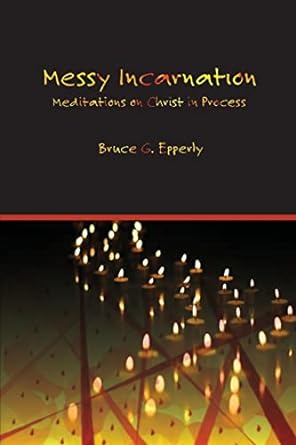- Home
- Process Worldview
- Community
- Art and Music
- Whitehead and Process Thinking
- Podcasts
- Spirituality
- Ecological Civilization
- Education
- Contact
- Social Justice
- Science
- Animals
- Sacred Poems
- Whitehead Videos
- Index of All Titles
- Practicing Process Thought
- Process Spirituality: A Spiritual Alphabet
- Recent Posts
No Room in the Inn
A Process Theology of the Manger
The bare manger: the lowly man, homeless and self-forgetful,
with his message of peace, love, and sympathy.
-Alfred North Whitehead
The manger is a feeding trough for animals. Jesus was cradled in a manger, with no crib for a bed. In the Gospel of Luke, we read that Mary "wrapped him in cloths and placed him in a manger because there was no guest room available for them."
In fourth-century catacomb paintings, the manger is often depicted as a wicker basket or a stone trough, reflecting the practical objects used for feeding animals during that period. In our time, it is often depicted as a wooden structure, adorned with straw, representing the simplicity and rusticity of the stable environment. Both portrayals underscore the humble circumstances of Jesus’ birth.
What does the manger say to us? What does a theology of the manger look like? Open and relational theologies offer one perspective.
For all Christians, process and otherwise, the manger symbolizes the humility and simplicity of Christ's birth. For some who imagine God in monarchical terms, these humble beginnings may seem to contrast with Jesus' divine nature. Jesus becomes, for them, a king in the sky despite his humble birth.
Open and relational theologians, including process theologians, disagree. They view the images of Jesus in a manger as continuous with God's nature. They find God in images "the bare manger: the lowly man, homeless and self-forgetful, with his message of peace, love, and sympathy." If this is royalty, it is of a different kind. Its essence is humility not power.
The nurturant God described by process theologians does not live in a gated community; God, too, often has no place in the inn. God's openness includes a boundless love that is quiet and humble in its nature, reaching out to the marginalized of society in a special way.
The manger also symbolizes the longings of God for how we might live in the world. It is an invitation to live for love, not greed; for compassion, not money; for receptivity, not self-protection. It is an invitation to recognize that God is not about mansions and estates, about fine living that leaves others behind; and to understand that the very desire for opulence, wealth, and status is inconsistent with God's longings for who we humans might become in relation to one another and the world. God's hope is that we might take on the manger mind-set, the manger mentality. That our hearts might become mangers, too: spaces that can cradle each and every human being in love.
For Christians in affluent settings, both middle class and upper class, taking on the heart of the manger best begins with struggling against the desire for opulence and status, recognizing that this very desire is an obstacle to the life of faith. This means rejecting images of "success" that are materialistic, measured in terms of the size of a bank account and the number of properties owned, and embracing the radical idea that truly "successful" people in our world are quiet, humble servants of love, who live simply and frugally, with service, not achievement, as their aim. This new and more Christian understanding of success runs counter to what many Americans consider the American Dream, but it is much closer to the dreams of Jesus and the dreams of God.
We must be honest. It is as difficult for a middle or upper-class Christian to be transformed into this new image of success as it is for a camel to pass through the eye of a needle. However, it is possible with help from others and God's grace. As this shift occurs, the Christian rightly seeks to "go and sell all his possessions and give to the poor." What this means will differ, circumstance by circumstance. But selling possessions will create a space in the heart that is good and true and beautiful, a place where infants can lay, including holy ones. When there is no room in the inn, there is much room in the heart.
- Jay McDaniel
In fourth-century catacomb paintings, the manger is often depicted as a wicker basket or a stone trough, reflecting the practical objects used for feeding animals during that period. In our time, it is often depicted as a wooden structure, adorned with straw, representing the simplicity and rusticity of the stable environment. Both portrayals underscore the humble circumstances of Jesus’ birth.
What does the manger say to us? What does a theology of the manger look like? Open and relational theologies offer one perspective.
For all Christians, process and otherwise, the manger symbolizes the humility and simplicity of Christ's birth. For some who imagine God in monarchical terms, these humble beginnings may seem to contrast with Jesus' divine nature. Jesus becomes, for them, a king in the sky despite his humble birth.
Open and relational theologians, including process theologians, disagree. They view the images of Jesus in a manger as continuous with God's nature. They find God in images "the bare manger: the lowly man, homeless and self-forgetful, with his message of peace, love, and sympathy." If this is royalty, it is of a different kind. Its essence is humility not power.
The nurturant God described by process theologians does not live in a gated community; God, too, often has no place in the inn. God's openness includes a boundless love that is quiet and humble in its nature, reaching out to the marginalized of society in a special way.
The manger also symbolizes the longings of God for how we might live in the world. It is an invitation to live for love, not greed; for compassion, not money; for receptivity, not self-protection. It is an invitation to recognize that God is not about mansions and estates, about fine living that leaves others behind; and to understand that the very desire for opulence, wealth, and status is inconsistent with God's longings for who we humans might become in relation to one another and the world. God's hope is that we might take on the manger mind-set, the manger mentality. That our hearts might become mangers, too: spaces that can cradle each and every human being in love.
For Christians in affluent settings, both middle class and upper class, taking on the heart of the manger best begins with struggling against the desire for opulence and status, recognizing that this very desire is an obstacle to the life of faith. This means rejecting images of "success" that are materialistic, measured in terms of the size of a bank account and the number of properties owned, and embracing the radical idea that truly "successful" people in our world are quiet, humble servants of love, who live simply and frugally, with service, not achievement, as their aim. This new and more Christian understanding of success runs counter to what many Americans consider the American Dream, but it is much closer to the dreams of Jesus and the dreams of God.
We must be honest. It is as difficult for a middle or upper-class Christian to be transformed into this new image of success as it is for a camel to pass through the eye of a needle. However, it is possible with help from others and God's grace. As this shift occurs, the Christian rightly seeks to "go and sell all his possessions and give to the poor." What this means will differ, circumstance by circumstance. But selling possessions will create a space in the heart that is good and true and beautiful, a place where infants can lay, including holy ones. When there is no room in the inn, there is much room in the heart.
- Jay McDaniel
The Essence of Christianity
The essence of Christianity is the appeal to the life of Christ as a revelation of the nature of God and of his agency in the world. The record is fragmentary, inconsistent, and uncertain. It is not necessary for me to express any opinion as to the proper reconstruction of the most likely tale of historic fact. Such a procedure would be useless, without value, and entirely out of place in this book. But there can be no doubt as to what elements in the record have evoked a response from all that is best in human nature. The Mother, the Child, and the bare manger: the lowly man, homeless and self-forgetful, with his message of peace, love, and sympathy: the suffering, the agony, the tender words as life ebbed, the final despair: and the whole with the authority of supreme victory.
- Alfred North Whitehead, Adventures of Ideas
- Alfred North Whitehead, Adventures of Ideas
He went away grieving,
for he had many possessions.
Matthew 19:16-22
Then someone came to him and said, “Teacher, what good deed must I do to have eternal life?” And he said to him, “Why do you ask me about what is good? There is one who is good. If you wish to enter into life, keep the commandments.” He said to him, “Which ones?” And Jesus said, “You shall not murder. You shall not commit adultery. You shall not steal. You shall not bear false witness. Honor your father and mother. Also, you shall love your neighbor as yourself.” The young man said to him, “I have kept all these;[a] what do I still lack?” Jesus said to him, “If you wish to be perfect, go, sell your possessions, and give the money to the poor, and you will have treasure in heaven; then come, follow me.” When the young man heard this word, he went away grieving, for he had many possessions.
God is alive and well, but not
in a gated community.
One of the core messages of nativity scenes is that God does not live in a gated community, God lives in a manger where there is no crib for a bed, with families who could find no room in the inn. Like this family, God does not have a private security guard or a staff of helpers. God has never taken an expensive vacation, owned a country retreat, or stayed at the Ritz. God does not hang out with celebrities or have toilet seats made of gold. God doesn't play golf. God knows that some people mistakenly believe that the purpose of life is to be rich and to climb a ladder of success, leaving others behind. But God wants to leave no one behind. It irritates God off that so many people live with so much, while others have so little. God dreams of a time when everyone will have a place to stay and people will live lovingly with one another, without some trying to get ahead of others. Meanwhile, God stays in the manger with the family. God feels more at home with them. God likes the animals, too.
- Jay McDaniel
- Jay McDaniel
No comfort bubbles.
A comfort bubble is a psychological state in which individuals surround themselves with familiar and comfortable circumstances to the point of avoiding or ignoring challenges, discomfort, and the suffering of others. They are be willing to endure suffering with friends and family, but they try to avoid the sufferings of those outside their comfort spheres. It's too "depressing." Within their bubble, they try to maintain a sense of security, routine, and emotional well-being. They organize their lives around luxury and privilege. A life of comfort, isolated from the harsh realities of the world, punctuated with opportunities for recreational pleasure, is their dream. This is not God's dream. God prefers the manger to a comfort bubble.
- Jay McDaniel



